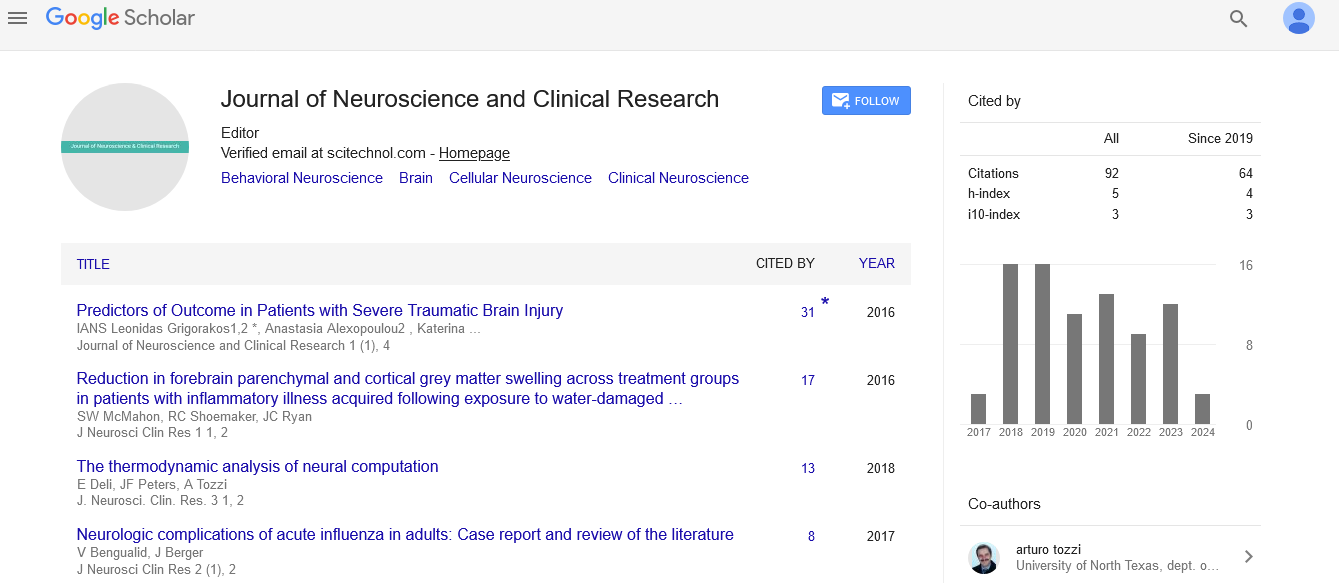Commentary, J Neurosci Clin Res Vol: 9 Issue: 1
Interpreting Mind: The Limits of Cognitive Neuroscience
Angiole Balconei*
1Department of Psychology, Catholic University of the Sacred Heart, Milan, Italy
*Corresponding Author: Angiole Balconei,
Department of Psychology, Catholic
University of the Sacred Heart, Milan, Italy
E-mail: balconeian@gmail.com
Received date: 26 February, 2024, Manuscript No. JNSCR-24-131640;
Editor assigned date: 28 February, 2024, PreQC No. JNSCR-24-131640 (PQ);
Reviewed date: 14 March, 2024, QC No. JNSCR-24-131640;
Revised date: 21 March, 2024, Manuscript No. JNSCR-24-131640 (R);
Published date: 28 March, 2024, DOI: 10.4172/Jnscr.1000180
Citation: Balconei A (2024) Interpreting Mind: The Limits of Cognitive Neuroscience. J Neurosci Clin Res 9:1.
Abstract
In the kingdom of neuroscience, the study of cognition has long been a focal point of research, seeking to unravel the mysteries of how the brain processes information, makes decisions, and ultimately gives rise to human consciousness. Cognitive neuroscience, as a specialized branch of neuroscience, endeavors to bridge the gap between the physical mechanisms of the brain and the complex phenomena of the mind. As we delve deeper into this field, the frontiers of cognitive neuroscience offer tantalizing prospects for understanding the very essence of thought itself. At the heart of cognitive neuroscience lies the exploration of neural mechanisms underlying cognitive functions such as perception, attention, memory, language, and decision-making. Traditional techniques such as brain imaging, electrophysiology, and lesion studies have provided invaluable insights into the localization and organization of cognitive processes within the brain. However, recent advancements in technology and methodology have propelled cognitive neuroscience into new territories, opening doors to unprecedented levels of understanding
Description
In the kingdom of neuroscience, the study of cognition has long been a focal point of research, seeking to unravel the mysteries of how the brain processes information, makes decisions, and ultimately gives rise to human consciousness. Cognitive neuroscience, as a specialized branch of neuroscience, endeavors to bridge the gap between the physical mechanisms of the brain and the complex phenomena of the mind. As we delve deeper into this field, the frontiers of cognitive neuroscience offer tantalizing prospects for understanding the very essence of thought itself. At the heart of cognitive neuroscience lies the exploration of neural mechanisms underlying cognitive functions such as perception, attention, memory, language, and decision-making. Traditional techniques such as brain imaging, electrophysiology, and lesion studies have provided invaluable insights into the localization and organization of cognitive processes within the brain. However, recent advancements in technology and methodology have propelled cognitive neuroscience into new territories, opening doors to unprecedented levels of understanding.
One of the most revolutionary developments in cognitive neuroscience has been the advent of Functional Magnetic Resonance Imaging (FMRI). This non-invasive imaging technique allows researchers to visualize brain activity by measuring changes in blood flow, providing detailed maps of neural activity associated with different cognitive tasks and states. With fMRI, scientists can explore the dynamic interactions between different brain regions, shedding light on the intricate networks that underlie complex cognitive functions. The emergence of techniques such as optogenetics, which enables precise control of neural activity using light, has ushered in a new era of experimental manipulation in cognitive neuroscience. By selectively activating or inhibiting specific neural circuits in animal models, researchers can directly investigate the causal relationships between brain activity and behavior, uncovering the fundamental principles governing cognitive processes. Advancements in computational modeling have played a pivotal role in shaping our understanding of cognition. By constructing mathematical models that simulate the underlying mechanisms of neural processing, researchers can generate testable hypotheses and make predictions about brain function. These models not only provide insights into normal cognitive processes but also offer valuable frameworks for understanding neurological disorders and designing interventions to address them.
Another frontier of cognitive neuroscience lies in the exploration of Brain-Computer Interfaces (BCIs), which hold the potential to revolutionize our interactions with technology and enhance human cognitive abilities. By decoding neural signals related to intention, BCIs enable individuals to control external devices using their thoughts alone, offering hope for restoring motor function to those with paralysis and opening up new possibilities for human-computer interaction.
Venture into these uncharted territories, ethical considerations loom large. The ability to manipulate brain activity and decode mental processes raises profound ethical questions about privacy, autonomy, and the potential misuse of neurotechnologies. It is imperative that researchers, policymakers, and society at large engage in thoughtful discourse to ensure that the benefits of cognitive neuroscience are balanced with ethical safeguards and responsible stewardship.
Conclusion
In conclusion, the frontiers of cognitive neuroscience hold promise for unraveling the mysteries of thought and consciousness, offering unprecedented opportunities to explore the inner workings of the human mind. By harnessing technological advancements, embracing interdisciplinary collaboration, and upholding ethical principles, we can chart a course towards a deeper understanding of cognition and its neural underpinnings, ultimately unlocking new insights into what it means to be human.
 Spanish
Spanish  Chinese
Chinese  Russian
Russian  German
German  French
French  Japanese
Japanese  Portuguese
Portuguese  Hindi
Hindi 